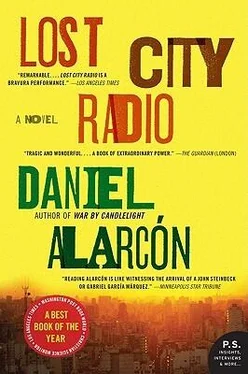“It’s a mistake, it must be a mistake.” She wanted to laugh, and she did — but it came out nervously, awkwardly, as if she were hiding something. Elmer frowned. “I’ll keep it,” Norma said. “I can do the show without his name.”
“But I’ll hold the list.”
“Don’t you trust me?”
Elmer sighed. “Everyone on this piece of paper could be guilty of something. I don’t want to take that chance. It’s my life too, you know. I’m responsible for this station.”
“I’ll get to the bottom of this.”
Elmer shook his head, and he certainly had his reasons — good, solid reasons — but she wasn’t listening. He spoke, he explained with his hands, his fists opening and closing. His face was soft and understanding — it didn’t matter. Surely he invoked her own safety, their friendship, strained at times but real — she couldn’t hear him. Hadn’t he always cared for her? Hadn’t he stayed by her side through all of this, and never betrayed her? There were other men — he said carefully — who could not truthfully make such claims.
But Norma wouldn’t hear him. She stood and knocked on the window of the control room until she had the boy’s attention. She gave him a big smile, and could feel the muscles of her face working. He was young. He smiled back.
Norma held the list up to the light. There was a single spot of black ink next to her husband’s false name, where Elmer had touched the paper with the very tip of the marker.
“What are you doing?” Elmer asked.
The boy watched through the window. Norma folded the note into fourths. Without saying a word, she lifted her shirt and slipped the list into her underwear.
Elmer rubbed his chin. “Is this your idea of a joke?”
She pointed Victor to the door. On the other side of the window, Len shrugged. The boy disappeared through the door. He would wait for her. Norma turned to Elmer. “I’m sorry,” she said, and left the control room without another word. He let me leave, she thought, the door closing behind her. “Norma,” Elmer said, but that was all.
Victor was waiting for her in the station’s dilapidated version of a green room. He sat on a couch of sunken cushions, poking his pinky finger into the torn upholstery.
“Lunch,” Norma said in her sweetest voice. Her heart was pounding: she could feel it in her chest, in her throat. “Do you want lunch?”
Victor grinned. Boys his age were always hungry. Of course he wanted lunch. To the elevator then and through the lobby — give the receptionist a smile and a nod — now out into the streets. She took his hand.
They left the radio and made their way to Newtown Plaza, to the reconstructed heart of the city, twenty blocks or more from the station. At the station she’d left behind, Elmer was stewing. She felt sure of this, could almost see him, pacing the halls of the radio, considering his options. Maybe he would send someone after her. Maybe there would be police waiting at her apartment that night. Norma doubted it. Elmer had let her go, after all, with the list. She could feel it against her skin. She was safe for now. Norma and Victor passed restaurant after restaurant, and at each one, the boy slowed, lingering for a moment at its doorway. Chickens turning on spits in the windows, buxom waitresses handing menus to passersby, and Victor took each one, stuffing them into his pocket as Norma dragged him on. She wanted to be tolerant of his curiosity, but it was hard at a moment like this. There were soldiers on every other corner, so much a part of the scenery that they had become nearly invisible: the same boys with rifles that had tormented her once, that had dragged her Rey off a bus twenty years before. Pedestrians moved chaotically between the featureless, modern buildings, beneath a clouded sky that threatened to clear. Taxis honked, vendors shouted, police whistles squealed.
They found a place and sat in the back, far from the noise of the street, in a corner of mirrored walls and glowing tubes of neon light spelling out the names of local beers and sports teams. The waitress was pretty but with bad teeth, and had a jungle accent she seemed to be trying to mask. The food came quickly. Victor drank orange soda through a straw and ate greedily with his hands, content to do so in silence. Norma picked at the fries, sipped her water. Eleven: in a year, Victor would be a different person; in five, unrecognizable and nearly a man. He ate, smiling now and then with bits of chicken stuck between his teeth. He swished mouthfuls of orange soda, puffing out his lips and cheeks. She had the urge to rub her hand across his shaved head: it would be prickly, like sandpaper. Her mind skipped over moments of the previous ten years, and then the decade before that, images of Rey and his various names, his hidden histories, his evasions, his disappearances and disguises. The boy deserved to know.
“There was a name on the list.” She breathed deeply and exhaled. Slowly. Norma took a pen from her purse and wrote the name on a napkin, in capital letters. She observed it. How long had it been since she’d written it out — this oddly spelled name from her past? A decade — or more? Since she wrote him love letters in the weeks after his disappearance, addressed to the name on the ID she’d found in her pocket— that long. She sighed. “Do you recognize it?”
Victor worked on a mouthful of chicken. Looking the name over carefully, he shook his head. “How do you say it?”
Norma smiled. She took a sip of Victor’s soda. The bottle was cold and moist in her palm. She wiped its wetness on her forehead. The headache she’d had since the station subsided for just a moment. Her voice nearly broke.
Victor repeated it. “What was he like?”
The boy wanted to know what he was like. She’d never heard anyone say the name aloud; it made her smile.
Or rather, nearly cry. One of those smiles that hold back so much, a dishonest smile. Where to begin? In the mirrored walls, Norma could see the street and its furious movement, men and women caught in the city’s fevered charade of reconstruction. It was worth asking: Had there ever been a war? Was it something we all imagined? Newtown Plaza was only a few blocks away, a monument to forgetting built atop the ruins of the past. What was he like? Thank God for mirrors, Norma thought, and for these people and those people rushing past, for the frantic work of survival, but none of them were Rey and none of them knew his name: he was a liar, a beautiful man who told beautiful lies. In the restaurant, there were neon lights and long-legged waitresses with breasts bursting from orange tube tops, women dressed like candy to be eaten, bedecked in the colors of boxes of laundry detergent. Clean, young vixens! This city would drive her mad, or her loneliness would, and still Victor watched her in the mirror, eyes darted about, a nation at feeding time, chicken was torn from the bone, devoured, a dozen young and old faces were adorned with greasy smiles. An insipid melody floated just below the hum of conversation, and Norma felt her head might explode.
“Are you all right?” the boy asked. His voice was soft.
Norma shook her head. “No.”
“My mother was this way sometimes.” He paused and leaned forward. “Like her head was coming loose.”
That was it exactly. Her head had come loose. Norma drew a deep breath. It had come loose that first night she met Rey, had stayed that way for decades. How much longer would this swoon last? Victor wiped his mouth carefully with the same napkin she’d written on. Norma took it from him and spread it flat on the table. It was stained and greasy, the smudged ink barely legible. Unrecoverable. She could feel the blood coloring her cheeks.
Victor apologized, but she waved it away. “See,” she said, “I don’t know what he was like. I thought I did. He wasn’t a stranger. We were together for so long. And we’ve been apart so long.” She sighed. “Then he reappears sometimes. And today, it feels”—how did it feel? — “like a joke.”
Читать дальше












